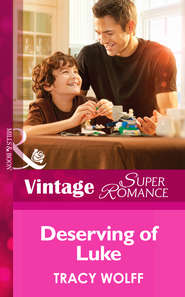По всем вопросам обращайтесь на: info@litportal.ru
(©) 2003-2024.
✖
Healing Dr. Alexander
Автор
Год написания книги
2018
Настройки чтения
Размер шрифта
Высота строк
Поля
“Really? Which one?”
“For the Children. We’re a non-profit organization that goes into war-torn and disaster-stricken nations to establish medical care for people who wouldn’t otherwise have access to it.”
“I know who they are. I contribute every year during their big fundraising drive.”
He lifted an eyebrow. “From someone who’s worked for more than a decade in clinics that have benefitted from those donations, thank you.”
“I really admire what your organization does. It’s amazing to me the way you put your whole life on hold to help others.”
“My life wasn’t on hold. Going to those countries, working with For the Children, that was my life.” As soon as the words came out he looked sick, like he wanted nothing more than to never have said them.
Sophie thought she knew what it was like to have your whole life taken away with one pull of the trigger. She’d thought, when Jeff died, that everything had changed. But in the months that followed, she realized that in fact little had changed. Yes, she’d lost her husband. Yes, the boys had lost their father. But the truth was, Jeff had been gone more than he’d been around during their entire married life. Three tours in Iraq and one in Afghanistan had created a life at home, with the boys and with her career, that operated independently of him. And after he died, in a way, it simply continued that way.
Looking at Jack, hearing his story and seeing the small amount of pain he had exposed to her made her see that life had indeed changed irrevocably for Jack. With the injury to his operating hand and the trauma from being shot in the very clinic where he worked, there was probably no chance he could return to the life he loved.
Empathy pierced her and despite her feelings about apologies, she murmured, “I’m really—”
“Don’t say it.” His tone told her the conversation was closed.
Silence stretched taut between them as she continued to wash dishes and he continued to clear the table. When she could take it no longer, she asked. “So, where’s this clinic you’re working at now? Is it near here or—”
“It’s close to downtown.” He set the lasagna pan—the last thing to be brought over from the table—on the stove with an urgency that couldn’t be missed. “Thanks for dinner,” he continued. “But I should probably get going.”
“You don’t have to do that.”
“It’s late and I have work tomorrow.” Neither of them commented on the fact that it wasn’t yet eight o’clock. He made his way down the hallway, but she stopped him at the front door.
“At least stay for ice cream. I really am sorry. I didn’t mean to make you uncomfortable.”
“You didn’t.” It was an obvious lie. “Thank you again for the meal. I guess I’ll see you around.”
In other words, please don’t ever invite me over again. Nice job, Sophie, she told herself as she stepped back, watching as Jack fled. She’d invited him over to welcome him to the neighborhood and had, instead, managed to both hurt and embarrass him. Definitely not one of her better ideas.
Yet as she watched the lights come on in his house, she couldn’t help thinking that Jack needed someone to shake him up. Oh, he was doing a good job of coasting along, looking and acting normal. But below the surface lay a seething wound of anger and regret that was festering.
It was none of her business. She knew it wasn’t. And yet…and yet she kept seeing him in the yard with her sons. Happy, kind, engaged. A huge grin on his face as he forgot, for a moment, all the pain and rage he had inside.
That’s when she knew she wasn’t going to be able to leave well enough alone. It looked like she had a new project after all.
CHAPTER FIVE
THE PHONE RANG as Jack was coming in from work. He was tempted to ignore it—only a few people had his house number and he wasn’t in the mood to talk to any of them. But he felt that familiar tug of responsibility. What if something was wrong? He answered it.
“Jack?” His mother’s smooth, cultured tones slid through the line as soon as he picked it up.
“Hi, Mom.”
“How are you feeling?”
“Fine.”
“Really?” She sounded hopeful.
No, not really. His leg throbbed and he’d had to pass two patients on to one of the residents today because they needed stitches he couldn’t do. “Absolutely.”
“Oh, good. I’m so glad to hear that.”
Of course she was. It was so much easier to move on with life when one’s son wasn’t mucking it up by getting shot. “Do you need something, Mom? I just got in and I want to take a shower.”
“Your father and I are celebrating our fortieth wedding anniversary next month and I’ve decided to throw a party. Naturally, we want you to be there. Especially since you missed the one we threw for our thirty-fifth.” Five years had passed and Jack could still hear the note of accusation in her voice.
“I was in Rwanda, Mom. It wasn’t like I was around the block and refused to come.”
“Of course not. But now that you’re so much closer, there should be no excuses.” There was a will of steel running through the conciliatory words. “Besides, it will give your dad a chance to check you over, make sure you’re healing all right.”
“Dad’s not an orthopedist, Mom.”
“He’s a doctor. And we’re both worried about you.”
Jack sighed. Of all the things he hated about his damn injury, this definitely made the top two. His relationship with his parents, at least up until the shooting, could be described as a benign disagreement. His parents loved him, he loved them. They’d provided him with everything a kid could ever need and in return, he’d graduated top of his high school class, went on to Johns Hopkins undergrad and Harvard Med—where he graduated second in his class. And then he dared to do the unthinkable—he’d taken a job with For the Children against their wishes—a decision they never understood. Even so, they had still enjoyed trotting out tales of their philanthropist son at dinner parties.
Now that he was injured, he was still refusing to settle down into the expected¸ and ritzy, path of private practice. But their interest had taken a sharp upswing. Suddenly his mother was calling him regularly to check on him, while his sister was bombarding him with emailed articles about post-traumatic stress disorder and learning to live with disabilities. Even his father was getting in on the act, albeit more subtly. Even though Jack had taken the position at the clinic, and made it clear he had every intention of going back to Africa once his physical therapy was over, he continued to get interview requests and partnership offers from lucrative practices all over Boston. He knew very well that his father was responsible for every single one.
Jack tolerated their interference for the most part, knowing they were trying to be supportive in their own ways. But it was so unlike the comfortable distance that had existed before the shooting—and so much more intrusive than he wanted to deal with right now—that he didn’t quite know how to respond. So, with a silent apology to his sister, he very deliberately threw her under the bus.
Вы ознакомились с фрагментом книги.
Приобретайте полный текст книги у нашего партнера:
Приобретайте полный текст книги у нашего партнера:











